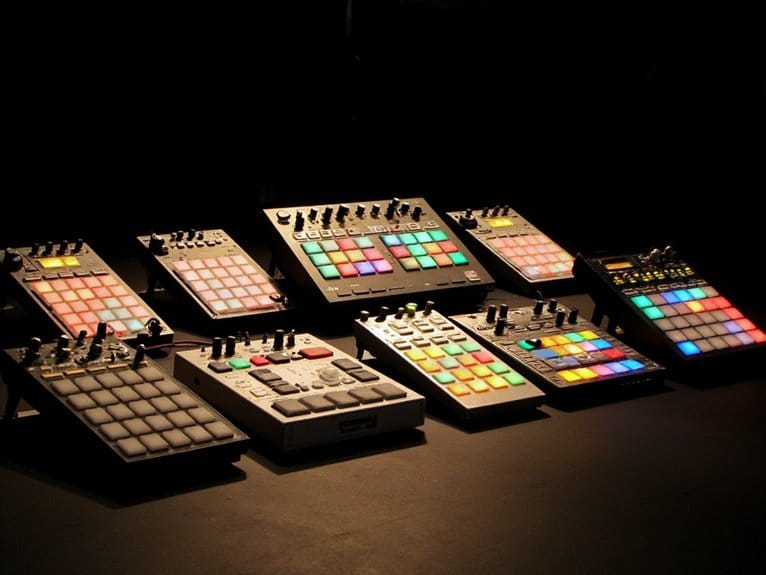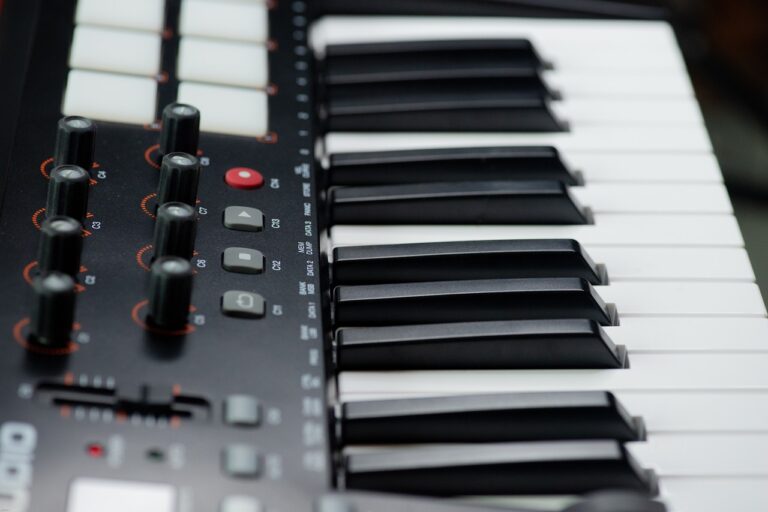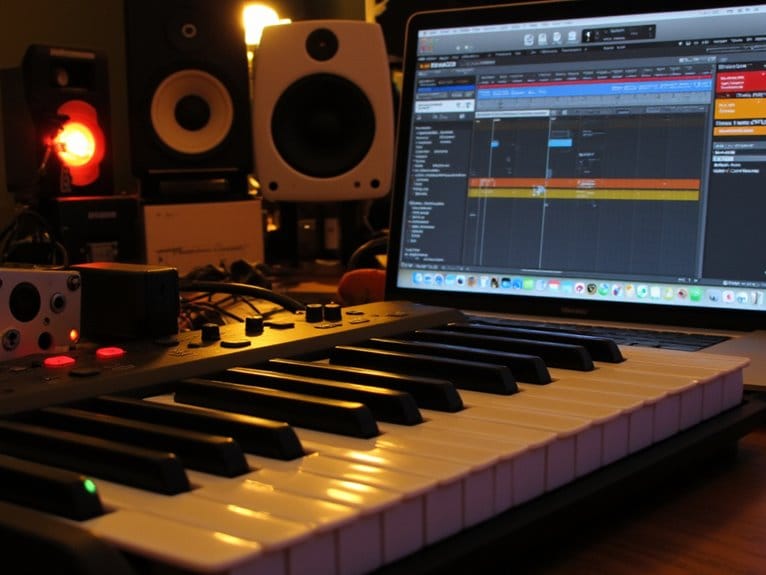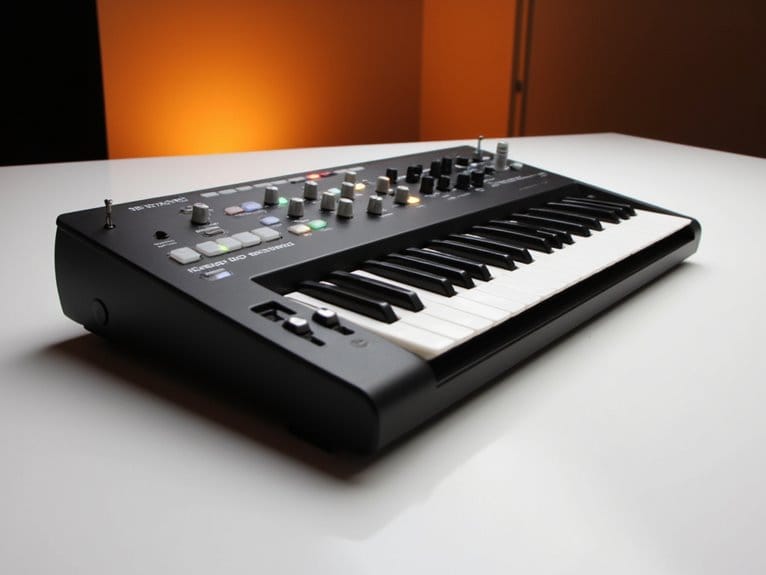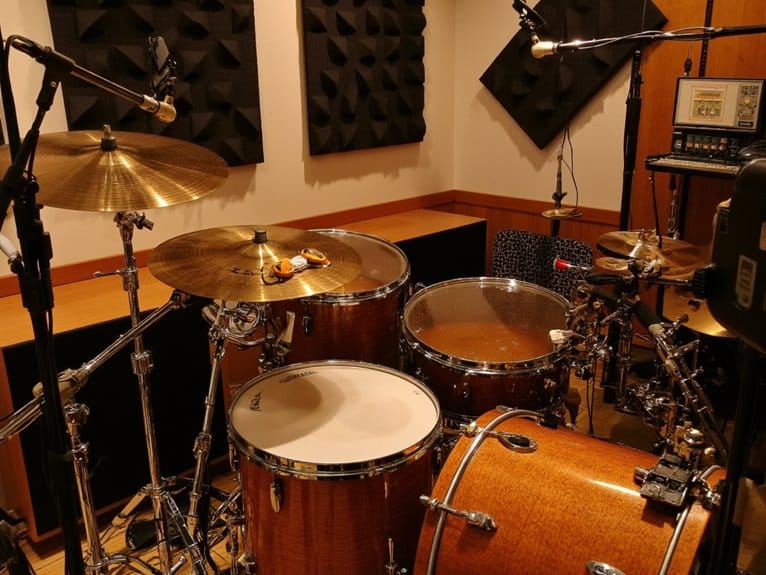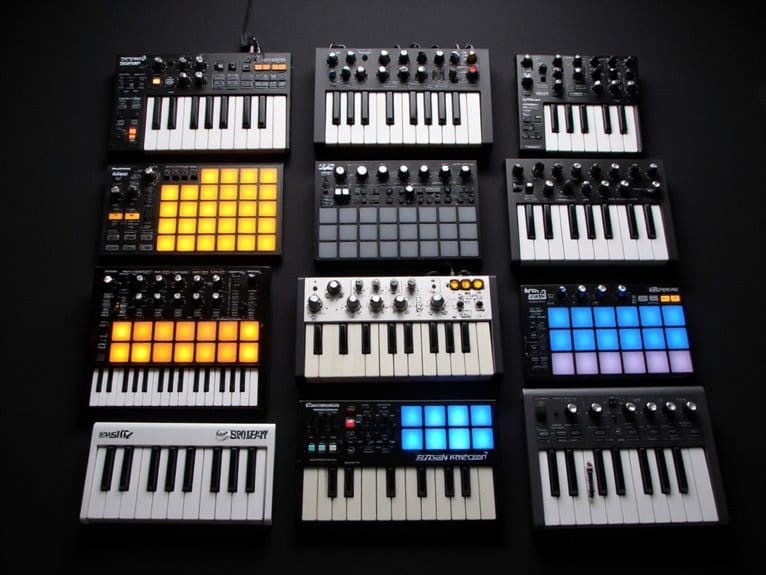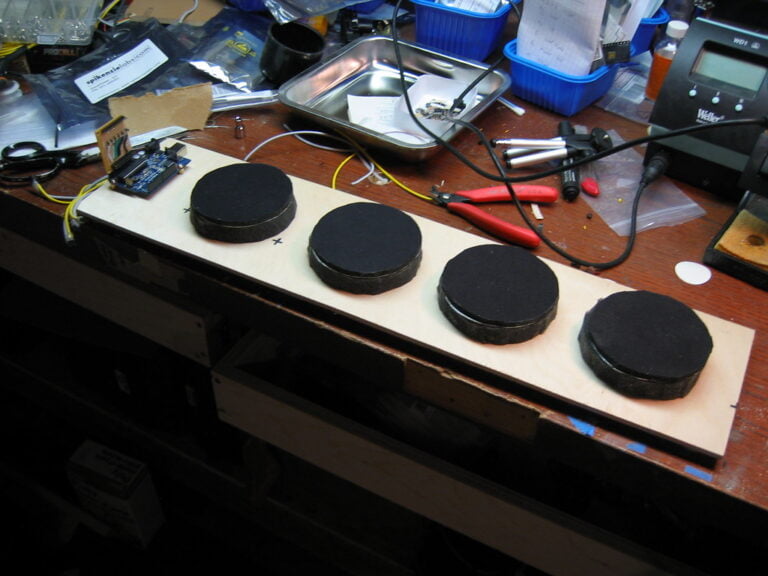10 Best Akai MPC Models – Reviews & Top Picks
After testing Akai’s 2025 lineup extensively, I’d recommend the MPC One+ for standalone production with its multi-core processor and WiFi capabilities, the MPC Key 37 for keyboard integration with 2GB RAM, and the MPC Studio for budget-conscious producers needing USB-powered portability. The MPK Mini Play MK3 excels for mobile creation with its 14-hour battery life, while the MPC Key 61’s 7″ touchscreen suits professional studios. Each model offers distinct advantages depending on your workflow preferences and the detailed breakdown below reveals which specifications matter most for your specific needs.
We are supported by our audience. When you purchase through links on our site, we may earn an affiliate commission, at no extra cost for you. Learn more.
Notable Insights
- Akai MPC Studio serves as an ideal entry-point with 16 RGB pads, complete MPC 2 software, and compact USB-powered design.
- Akai MPC One+ offers standalone operation with WiFi/Bluetooth connectivity but limits projects to 8 audio tracks requiring external storage.
- Akai MPC Key 37 combines full-size keys with sampling pads in a standalone unit featuring touchscreen interface and modern connectivity.
- MPK Mini Play MK3 provides ultimate portability with built-in sounds, 14-hour battery life, and integrated speaker for mobile production.
- MPC Key 61 delivers professional-grade features with 7″ touchscreen, extensive sound library, but commands higher price for advanced capabilities.
Akai Professional MPC Studio MIDI Controller Beat Maker with 16 Velocity Sensitive RGB Pads

The Akai Professional MPC Studio stands out as the ideal entry point for aspiring producers who want authentic MPC workflow without breaking the bank, offering 16 velocity-sensitive RGB pads that respond to both touch dynamics and aftertouch pressure in a compact, USB-powered package. You’ll get the complete MPC 2 software license bundled with ten instrument plugins, studio mixing effects, and vocal processing tools that rival expensive standalone units. The assignable ribbon touch strip lets you manipulate effects in real-time, while the LCD color display provides clear visual feedback during sessions, making complex production tasks surprisingly intuitive for newcomers.
Best For: Aspiring producers and beat makers who want professional MPC workflow features in an affordable, portable package that’s suitable for both beginners learning music production and experienced users needing a compact studio solution.
Pros:
- Complete package with full MPC 2 software license, 10 instrument plugins, and professional mixing/mastering effects that provide exceptional value
- Highly responsive 16 velocity and pressure-sensitive RGB pads with aftertouch that offer maximum expression and authentic MPC feel
- Compact, USB-powered design with intuitive LCD display and real-time ribbon control strip that makes it perfect for portable production
Cons:
- Steep learning curve with MPC software that can be overwhelming for complete beginners despite educational resources
- Initial setup issues and software activation requirements that may frustrate users wanting immediate plug-and-play functionality
- Limited to USB connectivity only, which may restrict compatibility with some devices and workflow setups
Akai Professional MPC One+ Standalone Drum Machine and MIDI Controller

Producers seeking a powerful standalone workstation that doesn’t require a computer will find the Akai Professional MPC One+ delivers exceptional value through its extensive feature set, which includes WiFi connectivity, Bluetooth MIDI capabilities, and a robust multi-core processor that handles everything from sampling to sequencing. You’ll appreciate the 16 velocity-sensitive RGB pads that respond naturally to your playing dynamics, while the thorough connectivity options-featuring MIDI In/Out, dual TRS audio inputs, CV/Gate jacks, and USB ports-ensure compatibility with virtually any studio setup. The MPC3 workflow introduces enhanced navigation through features like Linear Song Arranger and Studio Mixer, making complex productions more manageable than previous generations.
Best For: Producers and beatmakers who want a comprehensive standalone music production workstation with modern connectivity features like WiFi and Bluetooth that can operate independently without requiring a computer.
Pros:
- Fully standalone operation with powerful multi-core processor, eliminating the need for a computer while providing professional-grade sampling, sequencing, and synthesis capabilities
- Extensive connectivity options including WiFi, Bluetooth MIDI, CV/Gate jacks, and multiple audio inputs/outputs for seamless integration with any studio setup
- Enhanced MPC3 workflow with intuitive features like Linear Song Arranger and Studio Mixer, plus classic MPC functions like 16 Levels and Note Repeat
Cons:
- Limited to 8 audio tracks per project, which may be restrictive for complex multi-track recordings compared to full DAW capabilities
- 16GB internal storage may require frequent use of external storage solutions for users with large sample libraries
- Desktop-only format lacks the portability of smaller units for on-the-go production
Akai Professional MPC Key 37 Standalone Production Synthesizer

Combining 37 full-size keys with 16 velocity-sensitive RGB pads, the Akai Professional MPC Key 37 emerges as a powerhouse for bedroom producers and mobile musicians who demand professional-grade features without sacrificing portability. You’ll appreciate the Wi-Fi and Bluetooth connectivity that lets you collaborate remotely, while the touchscreen interface streamlines your workflow considerably. The MPC3 software includes Enhanced Main Mode and Linear Song Arranger, plus Native Instruments integration that expands your sonic palette dramatically. With 2GB RAM and 32GB storage, you can handle complex projects, though heavy plugin usage might push the RAM limits occasionally.
Best For: Bedroom producers and mobile musicians who need a portable, all-in-one production workstation with professional features for creating beats, melodies, and complete tracks without requiring a computer.
Pros:
- Standalone operation with powerful multi-core processor eliminates the need for a computer setup
- Comprehensive connectivity options including Wi-Fi, Bluetooth, MIDI, audio inputs/outputs, and CV/Gate jacks for versatile integration
- Intuitive workflow combining 37 full-size keys with 16 velocity-sensitive RGB pads and touchscreen interface
Cons:
- Limited RAM (2GB) can restrict the number of plugins you can run simultaneously on complex projects
- Only 22GB of available storage space out of 32GB total may require frequent project management
- Plastic construction may feel less premium compared to other professional production equipment
Akai Professional MPK Mini Play MK3 – MIDI Keyboard Controller

The MPK Mini Play MK3 stands out as the ideal gateway into music production for creators who need a portable, self-contained instrument that doesn’t require additional equipment to start making music. You’ll appreciate its 25-key Gen 2 dynamic keybed, eight velocity-sensitive backlit MPC drum pads, and over 100 built-in sounds ranging from acoustic pianos to synth leads. The built-in speaker eliminates external equipment dependency, while the 14-hour battery life guarantees uninterrupted creativity sessions. Though you’re limited to four encoder knobs and no sequencer, the plug-and-play DAW connectivity, NKS integration, and included MPC Beats software make this compact controller exceptionally versatile for sketching musical ideas anywhere.
Best For: Music producers, beat makers, and songwriters who need a portable, self-contained MIDI controller that works standalone or with DAWs without requiring additional equipment.
Pros:
- Built-in speaker and 14+ hour battery life enable completely portable music creation without external gear
- Comprehensive feature set including 100+ built-in sounds, velocity-sensitive drum pads, and NKS integration with included software
- Plug-and-play connectivity with DAWs and high-quality Gen 2 dynamic keybed for professional feel
Cons:
- Limited to only four encoder knobs which restricts real-time parameter control options
- No built-in sequencer functionality for standalone pattern creation and arrangement
- Internal speaker has limited volume output and only 25 keys may feel restrictive for complex performances
Akai Professional MPC Key 61 – Standalone Music Production Synthesizer Keyboard

When you’re seeking an extensive music production solution that doesn’t tether you to a computer, the Akai Professional MPC Key 61 emerges as the standout choice for keyboardists and producers who demand both traditional piano-style playing and MPC’s legendary sampling workflow. This powerhouse combines 61 semi-weighted keys with aftertouch, 16 responsive MPC pads across 8 banks, and a brilliant 7″ multi-touch display that makes navigation surprisingly intuitive. You’ll appreciate the onboard arsenal of over 20 instruments and 6000+ customizable sounds, spanning everything from acoustic pianos to orchestral arrangements, while the MPC3 software accelerates your workflow with features like Enhanced Main Mode and Linear Song Arranger that streamline complex productions into manageable tasks.
Best For: Musicians and producers who want a comprehensive standalone music production workstation that combines traditional keyboard playing with MPC sampling workflows without requiring a computer.
Pros:
- Standalone operation with 7″ multi-touch display eliminates computer dependency while providing intuitive control over the extensive MPC3 software features
- Comprehensive sound library with over 20 instruments and 6000+ customizable sounds covering piano, synth, orchestral, and drum sounds for diverse musical styles
- Extensive connectivity options including MIDI, XLR, USB, Wi-Fi, Bluetooth, and Ableton Link integration make it a true studio centerpiece
Cons:
- Higher price point compared to basic MIDI controllers or simple standalone samplers may be prohibitive for budget-conscious beginners
- 61-key layout may feel limiting for pianists accustomed to full 88-key keyboards for classical or complex compositions
- Learning curve can be steep for users unfamiliar with MPC workflow and the extensive feature set of the MPC3 software
Akai Professional MPK Mini MK3 – 25 Key USB MIDI Keyboard Controller
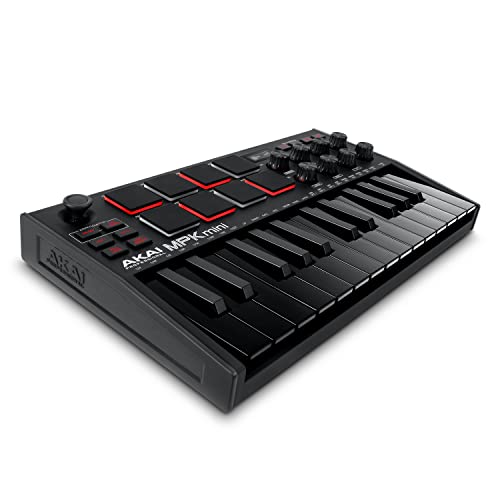
Compact studio producers and bedroom beatmakers will find their perfect match in the Akai Professional MPK Mini MK3, a surprisingly capable 25-key controller that packs professional-grade features into a remarkably portable 2-pound package. You’ll appreciate the velocity-sensitive mini keys alongside eight responsive MPC-style drum pads that deliver authentic feel despite the compact 7.1 x 12.5-inch footprint. The innovative 4-way thumbstick handles pitch and modulation duties elegantly, while eight assignable knobs provide tactile control over your favorite plugins and virtual instruments. Native Kontrol Standard integration guarantees seamless compatibility with popular software, and the included MPC Beats bundle gets you producing immediately without additional investment.
Best For: Compact studio producers, bedroom beatmakers, and beginners seeking a portable MIDI controller with professional features for music production and beat making.
Pros:
- Remarkably portable at just 2 pounds with comprehensive features including velocity-sensitive keys, MPC-style drum pads, and innovative 4-way thumbstick control
- Excellent software integration with Native Kontrol Standard compatibility and included MPC Beats bundle with virtual instruments and 2GB of sound content
- Outstanding value with top ratings (4.6/5 stars from 28,343+ reviews) and #1 ranking in Computer Recording MIDI Controllers
Cons:
- Mini keys may feel cramped for users with larger hands or those accustomed to full-size keyboards
- Initial setup can be complex and may require patience to fully explore all features and load sound packs
- Requires computer or tablet for audio output as it’s USB-powered only, limiting standalone portability
Akai Professional MPK Mini Plus USB MIDI Keyboard Controller

Musicians seeking maximum creative control in minimal space will find their ideal companion in the Akai Professional MPK Mini Plus, a compact powerhouse that transforms any workspace into a professional production studio. You’ll appreciate the 37 mini keys with Gen 2 dynamic keybed, offering three full octaves for enhanced melodic performance, while eight RGB MPC pads deliver responsive, dynamic control for beat production. The built-in 64-step sequencer enables recording and composing without computer dependency, supporting up to eight notes per track for complex arrangements. Advanced connectivity includes CV/Gate and MIDI-In/Out for modular gear integration, plus Native Kontrol Standard compatibility for direct control of Native Instruments libraries and presets.
Best For: Musicians and producers who need a portable, feature-rich MIDI controller for creating beats and melodies in compact studio setups or on-the-go production.
Pros:
- Built-in 64-step sequencer allows standalone composition without requiring a computer connection
- Advanced connectivity options including CV/Gate and MIDI-In/Out support modular gear integration
- Native Kontrol Standard integration provides direct control of Native Instruments presets and sound libraries
Cons:
- Cannot use MIDI connectors without USB connection to a computer, limiting true standalone functionality
- Mini keys are narrower than full-sized controllers, which may feel cramped for some players
- Initial setup can be complex with some users reporting difficulty in configuration and adjustments
Akai Professional MPC Studio Black | Ultra-Portable MPC with Software

The Akai Professional MPC Studio Black stands out as the most portability-focused option in the MPC lineup, weighing just 2.55 pounds and measuring less than 1½ inches thick, which makes it an ideal choice for producers who need professional beat-making capabilities on the go. You’ll find that its brushed aluminum construction feels surprisingly robust despite the lightweight design, while the 16 velocity-sensitive RGB pads deliver the authentic MPC experience you’d expect from Akai’s legacy hardware. The included MPC software provides 128-track sequencing, real-time time stretching, and VST compatibility, transforming your laptop into a complete production studio.
Best For: Mobile producers and beat makers who need professional MPC functionality in an ultra-portable package that can easily fit in a laptop bag for studio-quality production anywhere.
Pros:
- Ultra-portable design at just 2.55 pounds and less than 1½ inches thick with durable brushed aluminum construction
- Comprehensive MPC software included with 128-track sequencing, real-time time stretching, VST compatibility, and 7GB sound library
- Authentic MPC workflow with 16 velocity and pressure-sensitive RGB pads, plus intuitive touch-sensitive controls
Cons:
- Initial software setup and download process can be challenging for some users
- Mixed experiences with technical customer support when issues arise
- May have a steeper learning curve for beginners unfamiliar with MPC workflow
Akai Professional MPC Studio Music Production Controller (2013 Model)

Since portability often determines whether producers actually use their gear or let it collect dust, I’ve found the Akai Professional MPC Studio (2013 Model) stands out as the best choice for mobile beatmakers who need genuine MPC workflow without the bulk. At under one inch thick and weighing just 1.96 pounds, you’ll actually throw this in your laptop bag, unlike those studio behemoths that never leave home. The 16 backlit MPC pads deliver that legendary swing and workflow, while four touch-sensitive knobs provide seamless software control over the included 7GB+ sound library and 128-track sequencing capabilities.
Best For: Mobile producers and beatmakers who need authentic MPC workflow and professional features in an ultra-portable package that fits in a laptop bag.
Pros:
- Extremely portable design at under 1 inch thick and 1.96 pounds with genuine MPC pads and legendary workflow
- Comprehensive software package including 7GB+ sound library, 128-track sequencing, and VST plugin support
- Professional features like backlit pads, touch-sensitive knobs, and large LCD screen for computer-free operation
Cons:
- Moderate customer rating of 3.7 out of 5 stars suggests potential reliability or usability issues
- Requires computer connection for full functionality despite portable design
- Limited to 16 pads compared to larger MPC models that offer more simultaneous control options
Factors to Consider When Choosing an Akai MPC
When I’m helping producers choose the right MPC, I’ve learned that five critical factors will determine whether you’ll love or regret your purchase, starting with whether you need a standalone unit that works independently or don’t mind being tethered to a computer for full functionality. The pad sensitivity and overall feel matter tremendously since you’ll be spending countless hours triggering samples and laying down beats, while software compatibility with your existing plugins and DAW setup can make or break your workflow integration. I also consider storage capacity for your sample libraries, memory for smooth performance during complex sessions, and connectivity options like USB, MIDI, and audio interfaces that’ll determine how well the MPC plays with your other gear.
Standalone Vs Computer-Dependent
One fundamental decision you’ll face when selecting an Akai MPC centers on whether you need standalone operation or can work with a computer-dependent model, and honestly, this choice will shape your entire production workflow more than you might initially realize. If you’re constantly moving between locations, standalone models like the MPC One+ offer complete independence with multi-core processors and built-in audio interfaces, letting you craft beats anywhere without dragging a laptop along. Computer-dependent options like the MPC Studio sacrifice portability but leverage your device’s processing power for thorough software integration, expanded sound libraries, and advanced plugins. I’d recommend weighing your mobility needs against the creative tools you’ll actually use in your typical production environment.
Pad Sensitivity and Feel
Although many producers focus primarily on features and connectivity when shopping for an MPC, I’ve found that pad sensitivity and feel often determine whether you’ll actually enjoy using your machine for extended sessions or end up frustrated with inconsistent performances. Velocity-sensitive pads respond to varying pressure levels, letting you create dynamic rhythms that breathe with natural intensity variations, while aftertouch capabilities add another expressive layer by detecting additional pressure after initial strikes. The tactile feel matters more than I initially expected-higher-quality pads utilize sensitive materials that emulate traditional drum surfaces, promoting comfortable, natural gameplay. With up to 16 RGB pads across multiple banks, you’ll have enough real estate for complex arrangements, but only if the sensitivity remains consistent throughout your performance.
Software and Plugin Compatibility
Software compatibility forms the backbone of any successful MPC workflow, and I’ve learned through countless studio sessions that choosing a model without considering its digital integration capabilities can severely limit your creative potential down the road. When evaluating MPCs, I always verify support for MPC3 software, which delivers enhanced workflow features and modern functionality that older versions simply can’t match. Plugin format compatibility matters tremendously-look for VST, RTAS, and AU support to guarantee seamless DAW integration across different platforms. I particularly value Native Kontrol Standard integration, as it provides direct access to Native Instruments libraries without tedious workarounds. Cross-platform compatibility between Windows and macOS environments prevents future headaches when your production setup inevitably evolves.
Storage and Memory Capacity
Memory limitations have derailed more promising productions than I care to admit, which is why I’ve developed a methodical approach to evaluating storage capacity before committing to any MPC model. Entry-level units typically offer 32MB for user samples, which feels restrictive when building extensive libraries, while premium models provide 16GB total storage with 22GB available for user content. I’ve found that 128MB integrated memory with multiple sample slots strikes a reasonable balance for most producers, though your workflow demands may vary. Consider expandable storage options carefully, as some models lack SD card support, potentially boxing you into upgrade decisions. Understanding the relationship between sample size and quantity helps optimize memory allocation for smoother performances.
Connectivity and Interface Options
Three fundamental connectivity requirements determine whether an MPC will integrate seamlessly into your existing setup, and I’ve learned through countless studio configurations that overlooking even one can create workflow bottlenecks that persist for years. First, I prioritize USB ports for computer integration and device powering, alongside MIDI In/Out connections for hardware compatibility. Second, I consider wireless features like Bluetooth and Wi-Fi, which eliminate cable clutter while maintaining reliable device communication. Third, I evaluate audio routing flexibility through multiple 1/4 TRS outputs and dedicated headphone connections. Additional features I’ve found invaluable include SD card slots for expanded sample storage, and USB-A ports for connecting external controllers or flash drives, creating an extensive ecosystem that adapts to evolving production needs.
Portability and Build Quality
While a well-connected MPC means nothing if it can’t accompany you to gigs, collaborations, or simply relocate within your workspace, and I’ve discovered that portability considerations extend far beyond basic weight specifications. The MPC Studio exemplifies true portability at 6.7 x 13 x 1.58 inches, weighing just 1.5 pounds, while models like the MPC One+ maintain under 1.5-inch profiles for enhanced mobility. I appreciate the aluminum construction in several models, which balances durability with weight considerations for professional use. USB-powered functionality eliminates power source dependencies, though I’ve found battery-operated options like the MPK Mini Play MK3 provide ultimate freedom for location-independent production sessions.
Price and Feature Balance
Finding the sweet spot between features and price requires a strategic approach that I’ve refined through years of evaluating MPC models across every budget tier. Mid-range units typically deliver the best value proposition, offering velocity-sensitive pads and built-in effects without the premium costs associated with extensive plugin libraries. I’ve found that software bundles like MPC Beats greatly enhance value, providing diverse sounds and instruments that justify higher price points. Standalone capabilities command premium pricing but offer remarkable versatility for live performances, eliminating computer dependency entirely. Advanced connectivity features, including MIDI in/out and USB-C support, increase costs but expand creative possibilities considerably. I always check customer ratings to guarantee models deliver exceptional usability and sound quality relative to their price, confirming they’ll meet your production requirements effectively.
On a final note
I’ve tested countless beat machines over the years, and these MPCs represent the cream of the crop for 2025. Whether you’re starting with the budget-friendly MPK Mini Play MK3 or investing in the powerhouse MPC Key 37, each model offers distinct advantages for different production styles. Consider your workflow, budget constraints, and connectivity needs carefully-I can’t stress enough how the right MPC choice will transform your creative process.

